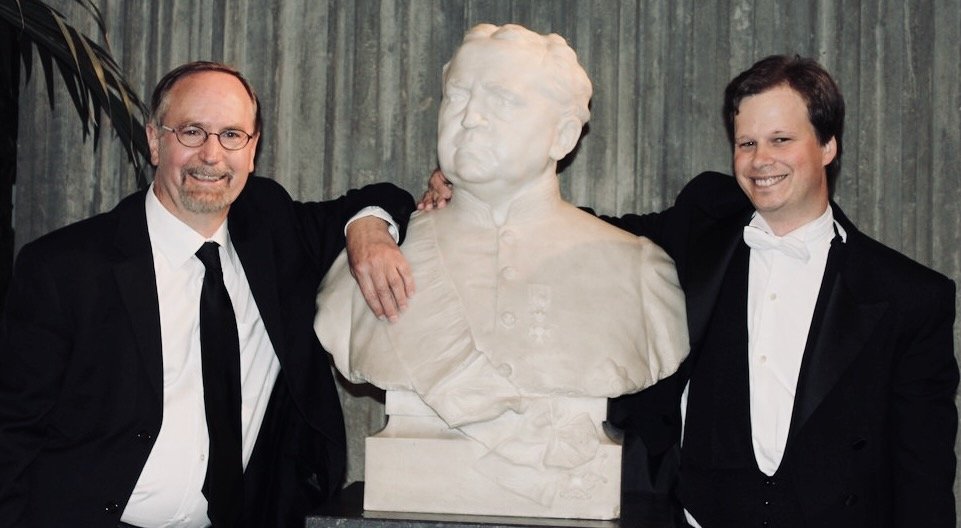True Religion?
Political Craziness
Europeans must think we Americans are nuts. How do we explain a political system where Mike Johnson, a Bible-thumping MAGA Republican who tried mightily to overturn the 2020 presidential election, can become second in line to the U. S. presidency?
A ReAwaken America event in 2022. Photo by Carolyn Kaster/AP
How do we account for the rabid support Donald Trump receives among pious White evangelicals who, in the words of conservative evangelical commentator David French, have placed “one of the most malignant figures in American politics within striking distance of the presidency, again”?
In a country that prizes racial and ethnic diversity, where leaders from Protestant, Catholic, Jewish, and Muslim traditions once collaborated to promote remarkable progress in political and civil rights, how have we arrived at the current strife-torn surge of religiously inflected White nationalism, antisemitism, and Islamophobia?
I’m not a sociologist, historian, or political pundit. So I won’t try to give those sorts of answers. But as a philosopher who cares about what my previous post calls “a spirit of goodness,” I can reflect on the place of religion in our current conflicts.
Religion as Social Institution
When we talk about religion, what are we talking about? In The Myth of Religious Violence (Oxford UP, 2009), William T. Cavanaugh argues religion does not have a timeless essence that we can neatly define. Rather, the concept of religion is a modern Western category that arises in relation to specific configurations of political power. I think he’s right in both respects: religion lacks a definable essence, and its concept has modern Western origins.
Nevertheless, various religions, as we now call them, do share certain prominent features. These shared features distinguish religion from other sorts of social institutions in the West, including the state, the economy, and personal relations such as friendships, families, and marriages. Perhaps that’s the first thing to get clear about: in contemporary society, religion is a distinct sort of social institution. Consequently, religion does have a legitimate and worthwhile role to play in society.
The author & Michael DeMoor with bust of Abraham Kuyper, July 2011
Yet religion should not try to do something more or be something else. I take this to be a fundamental implication of Abraham Kuyper’s social teachings about “sphere sovereignty,” one too few American evangelicals, who like to quote Kuyper, have understood.
Worship and Faith
Mihrab and maqsura, Mosque–Cathedral of Córdoba, Spain. Photo by Ángel M. Felicísimo from Mérida, España, CC BY-SA 2.0, via Wikimedia Commons
What, then, are the distinctive features of religion? I characterize religion as communal and organized worship of and faith in what ultimately sustains us. As I explain in the book Art, Education, and Cultural Renewal, the legitimate and worthwhile purpose of religion in modern, institutionally differentiated societies is “to help people worshipfully disclose the ultimate meaning of their lives—to find what ultimately sustains them in the face of both good and evil—and to do this while placing their hope and trust—their faith—in this source of ultimate sustenance” (p. 184).
Various religions have their own characteristic practices of worship, their own ceremonies, rituals, and devotional practices. They also have their own stories and symbols of faith, often encapsulated in sacred writings such as the Jewish Torah, Christian Bible, and Islamic Quran. All religions have such practices and stories, and these reveal a source of ultimate sustenance (often called “God”). That’s what characterizes all of them as forms of religion.
Secularism vs. Fundamentalism
By characterizing religion in this way, I aim to avoid two mistaken and damaging views of religion, damaging not only to religion but also to society as a whole. I call these views adamant secularism and fervent fundamentalism; I discuss them a greater length in my book Social Domains of Truth (pp. 252-65).
Photo by Jaclyn Moy on Unsplash
The adamant secularist thinks religion is a thing of the past, a historical curiosity, perhaps, but certainly not a legitimate and worthwhile domain in contemporary society. The sooner we get rid of religious superstitions and hang ups, the better. This, despite the fact that religious traditions continue to guide the vast majority of the world’s population. Adamant secularism leads many intellectuals to dismiss or ignore the concerns of religious communities.
The fervent fundamentalist, by contrast, thinks religion—especially the fundamentalist’s own religion—is the only truly legitimate and worthwhile domain in contemporary society. The sooner the rest of society falls in line with religious practices and teachings—in law, politics, education, public morality, you name it—the better society will be. This, despite the fact that we actually live in a religiously pluralistic world, in a double sense: people adhere to many different forms of religion and nonreligion, and religion itself is only one legitimate social domain among many. From fervent fundamentalism flows the current tendency among American evangelicals to politicize religion.
Inverted Fideism
It's not hard to see why adamant secularists and fervent fundamentalists are at each other’s throats. What’s harder to see is that both sides rely on a third, equally mistaken view of religion. For lack of a better term, let me call this view inverted fideism.
Traditionally, fideism is the position that reason is neither needed nor appropriate for exercising and justifying religious beliefs. Hidden within this position is an inversion of faith itself. This inversion turns faith into a matter of the religious beliefs we hold, beliefs like “God exists” or “The Bible is inerrant.” Adamant secularists think such beliefs are what religion is all about and then dismiss them as irrational nonsense. Fervent fundamentalists agree with this reduction of faith to beliefs and then try to impose their beliefs on everyone else.
If, as I’ve suggested, religion’s societal purpose is to help people worship and have faith in what ultimately sustains them, then it’s a mistake to equate religion with faith and an even worse mistake to reduce religious faith to our holding certain beliefs. Years ago, in the book Faith and Belief (Princeton UP, 1979), Wilfred Cantwell Smith, a Canadian Presbyterian scholar of comparative religions, showed that, across the world’s religions, faith is not belief. The “recent Western confusion” between faith and belief is “an aberration,” he wrote, and it “underlies much of the contemporary disarray” concerning the nature of religion (p. 9)—a point later reinforced by Charles Taylor’s massive study A Secular Age (Harvard UP, 2007). Faith is how people orient their lives—toward their ultimate sustainer, in my terms. Belief, by contrast, is “the holding of certain ideas” (p. 12).
To equate faith with belief is to boil down a rich and robust way of living to the attitudes we have toward particular statements and propositions. Then, when social trends and scientific discoveries make various religious teachings or doctrines seem implausible or factually false, a battle ensues over our beliefs, as if affirming or denying certain statements were the key to practicing “true religion.” But having faith is so much more than our believing something or other. And religion is so much more than faith.
Hopeful Trust
To avoid what I’ve called “inverted fideism,” perhaps we should stop talking about “faith,” which secularists and fundamentalists alike reduce to belief. Instead, let’s talk about what faith really is, namely, an orientation of hopeful trust, in all of life, toward that which ultimately sustains us. In my own terms, religious faith is the trust and hope, whether confident or shaken, that divine love and the spirit of goodness will come through for us within who we are and what we do. In a religious context, such trust and hope accompany practices of worship disclosing that which ultimately sustains us.
That, in my view, is what true religion is like. And its truth should be borne out in how its adherents conduct their lives, also in the political domain. Too many religionists try to impose religious beliefs on others by gaining and exerting political power. Such attempts do not testify to religious truth. Instead, they raise serious doubts about the truth of the religion in whose name certain beliefs are imposed.
Like fervent fundamentalists, adamant secularists are wrong about what true religion is like and why it matters. Yet they’re right in this respect: it would be better to have no religion than to promote a false one.




